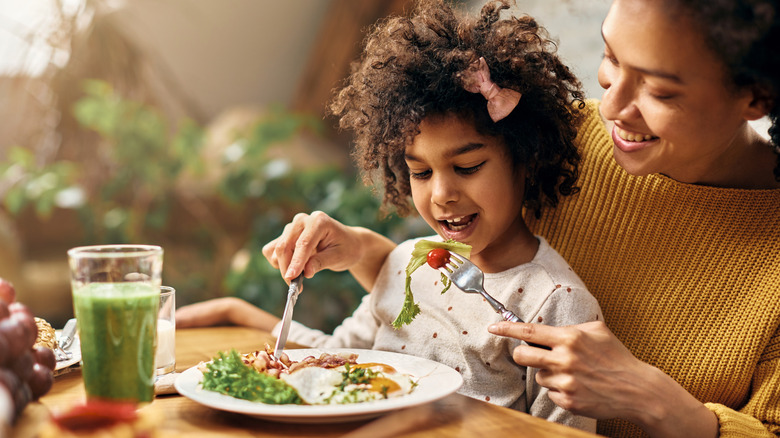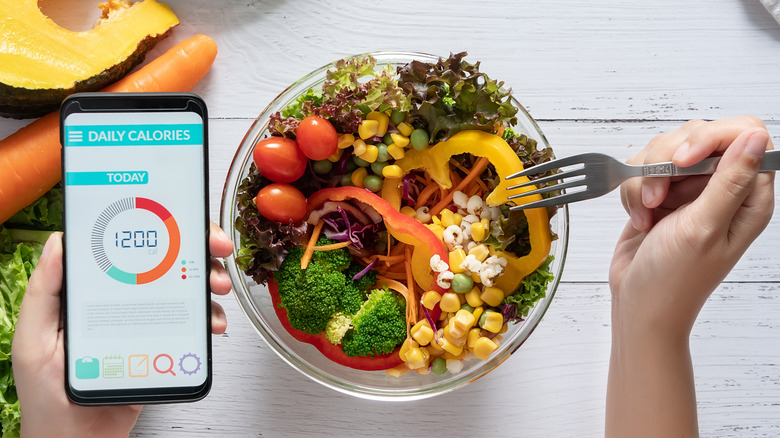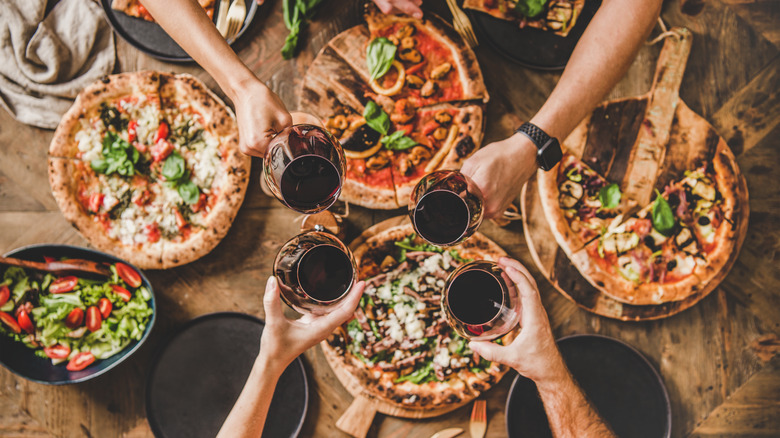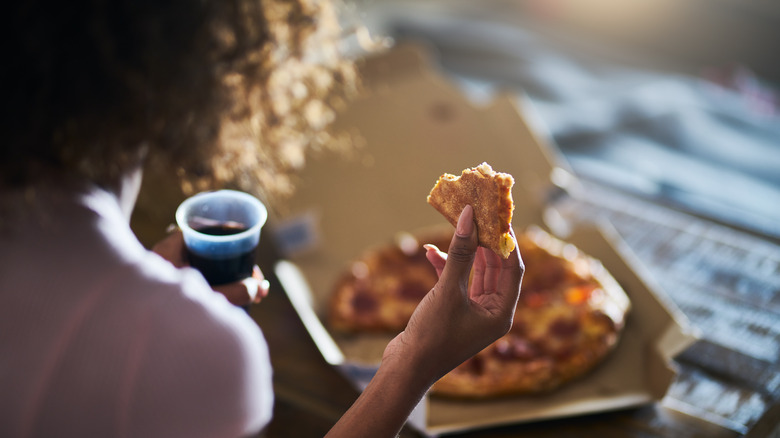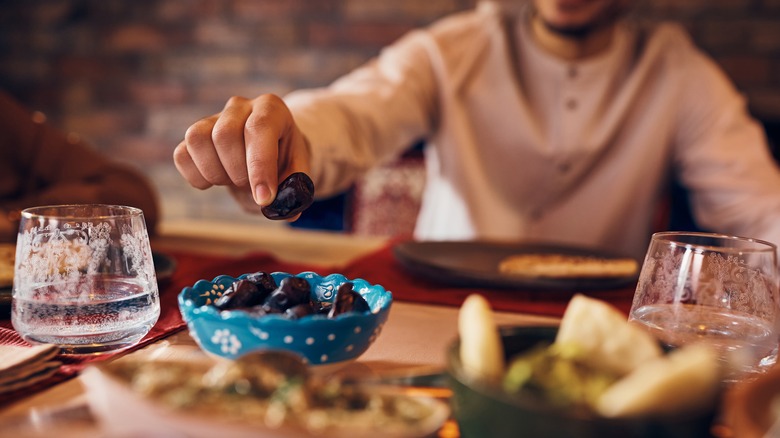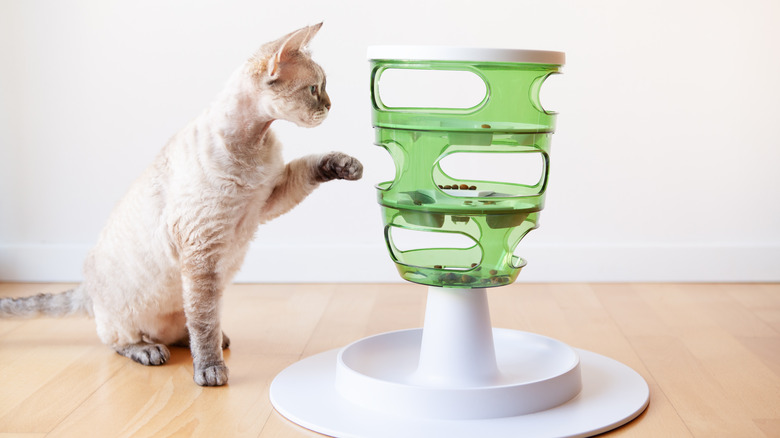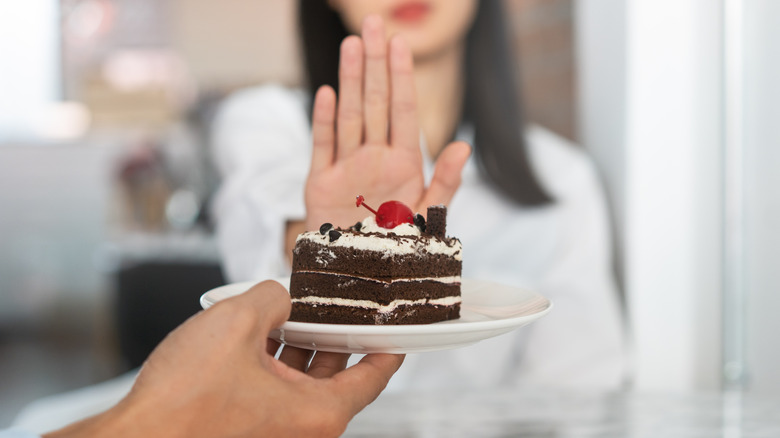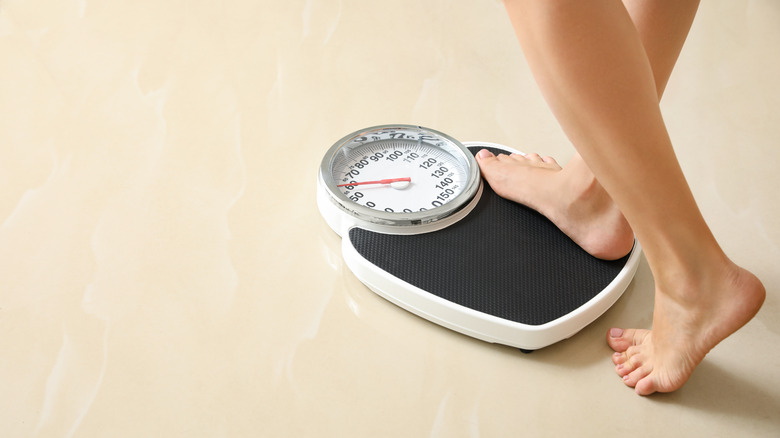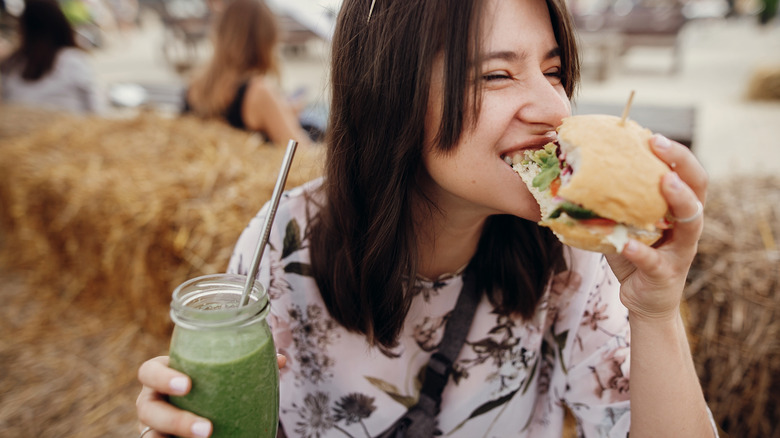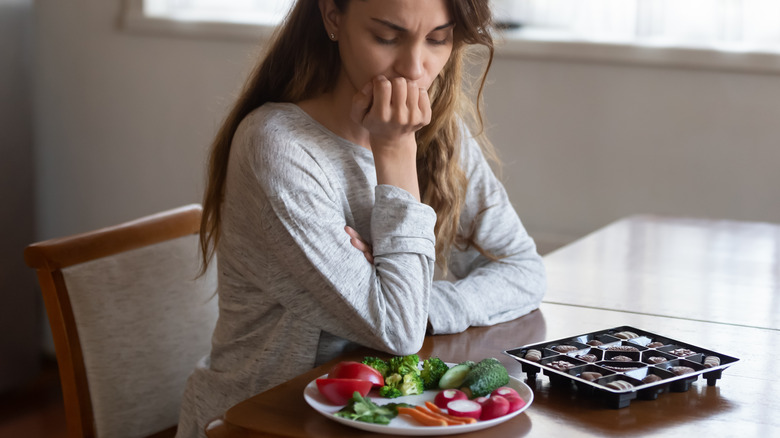What You Probably Didn't Know About Intuitive Eating
Intuitive eating is based on the premise that we're all born knowing how to eat, but we slowly lose this skill as we're constantly exposed to unhelpful messages about what we should eat and how we should look (via the National Eating Disorders Association).
Intuitive eating connects you once again to this innate wisdom. The movement is a rebellion against the "toxic" diet mentality that's permeated our culture for decades. It encourages eaters to reject external rules about food and instead listen to their own bodies.
The term "intuitive eating" was coined by registered dietitians and nutrition specialists Evelyn Tribole and Elyse Resch, alongside the publication of a book by the same name in 1995 (via The Original Intuitive Eating Pros). The philosophy encompasses 10 principles that promote body positivity and guide you towards honoring your body's natural hunger and fullness cues. Here are some things that you should know about intuitive eating.
Intuitive eating is an anti-diet approach
Intuitive eating is a non-diet approach that's continued to grow in popularity in recent years. Dieting is a form of temporary starvation, according to Elyse Resch, a registered dietitian and co-author of "Intuitive Eating" (via CNN Health). Whichever diet we choose, we're subjecting ourselves to rules and restrictions — and this is bound to eventually result in food obsession and troubled eating behaviors.
Repeatedly cutting back on calories and scrutinizing our food choices sends the body into survival mode, causing food cravings to escalate. When a person's natural biological hunger kicks in and they can finally eat after a long period of deprivation, they often find themselves bingeing uncontrollably. This is called the "last supper" syndrome, which is a consequence of thinking that we're indulging in a particular food for the very last time (via The Original Intuitive Eating Pros).
Research has shown that dieting is a common stepping stone to developing an eating disorder (via Public Health Nutrition). From an intuitive eating standpoint, the only way to sustain a peaceful relationship with food is to avoid dieting altogether. Instead, we can learn to eat in harmony with our true needs and desires by listening to our bodies.
Intuitive eating is not the same as flexible dieting
It's easy to confuse intuitive eating with flexible dietary control, since both approaches reject the all-or-nothing mentality associated with rigid dieting (via Appetite). But they are actually quite different.
Flexible dieting takes a more moderate approach and allows a greater variety of choices, explain researchers (via Journal of the International Society of Sports Nutrition). There are no "forbidden foods." Rather than exerting rigid control over their eating, individuals can choose any food they want and even indulge in their favorite dishes. They simply design their diet based on their lifestyle and preferences. This may involve calculating their calorie and macronutrient needs based on their weight or body goals. Moving away from a dichotomous mindset to a more flexible one means that eaters are less inclined to feel like they've "blown it" if they even slightly deviate from their eating plan.
Intuitive eating, by contrast, moves the needle away from dietary restraint. It doesn't impose any hard and fast rules about when, what, and how much to eat. Instead, it suggests that we can learn to eat intuitively by tapping into our body's internal cues such as our hunger, satiety, and cravings. Intuitive eating is associated with "lower rigid control, lower psychological distress, higher psychological adjustment, and lower BMI" compared to flexible dieting (per Appetite).
Eating for satisfaction is an important element of intuitive eating
One of the key principles of intuitive eating is that pleasure and satisfaction should be accepted as important aspects of the human eating experience (via The Original Intuitive Eating Pros). For too long, we've been culturally bombarded by the message that it's perfectly acceptable, if not sensible, to deny ourselves of these "basic gifts of existence" in the name of "health" or weight control. But the intuitive eating philosophy encourages us to challenge this line of thinking: Food isn't just about fuel and sustenance — it can also be a major source of joy.
"To me, satisfaction is the guiding force of intuitive eating because if you put your focus on being satisfied, then it's going to inform hunger, fullness and respecting your body, and it's going to inform making peace with food," Resch told CNN Health.
In contrast to the black and white thinking that comes along with dieting, intuitive eating promotes moderation. It reminds us that it's possible to be healthy while enjoying a wide range of delicious foods. A qualitative study published in Health Psychology Open found that for many women, recovering the ability to eat intuitively meant giving themselves "unconditional permission to eat" when and what they desired.
Can intuitive eating lead to binging?
Intuitive eating tells us that we should allow ourselves to eat the foods that we find pleasurable. But what if the foods we enjoy the most are pizzas, cakes, ice cream, and candy? Could intuitive eating lead to over-indulgence, binge eating, and ultimately, poor health? A common belief about intuitive eating is that giving ourselves the green light to eat whatever we want, whenever we want it, will ultimately result in chaos. But this is a myth, says registered dietitian and nutritionist Carrie Dennett in the April 2020 issue of Today's Dietitian.
Intuitive eating rejects the prescriptive approach associated with dieting. But this doesn't mean that we throw health and nutrition out of the window, explains Dennett. It simply guides us away from restrictive and superfluous rules, and toward a simpler and kinder style of healthy eating known as "gentle nutrition." This involves making food choices based on what our body needs and what we enjoy rather than agonizing over meeting specific nutritional requirements. Intuitive eating reminds us that we can trust our body's natural ability to choose and self-regulate (via The Original Intuitive Eating Pros). When we practice eating mindfully, slowly, and with awareness of our five senses, we can learn to eat in a moderate and healthy way.
Your body tells you when you're full
The concept of "interoceptive awareness" is the scaffolding behind intuitive eating (via Appetite). Simply put, this is the idea that we have the ability to identify, access, and respond appropriately to our body's internal signals, such as hunger and satiety. Listening to our body can help us navigate our food choices and let us know when we want to eat and when we've had enough.
Evelyn Tribole, dietitian and author of "Intuitive Eating," believes that the dieting ideology socializes us into demonizing our hunger and cravings (via Today's Dietitian). Chronic dieting erodes our ability to trust our body's physical sensations over time. Likewise, people with disordered eating behaviors may have learned to tune out and suppress feelings of hunger and fullness. But we can regain this connection to our body's cues once again, say researchers (via Health Psychology Open). Intuitive eating suggests that we can "retrain" ourselves to eat with full awareness and give attention to how we feel after our meals. As a result, it's possible for us to enjoy the foods that we want in quantities that feel good to us.
Intuitive eating isn't just about following your instincts
Intuitive eating advises us to listen to our bodies. It's inaccurate to interpret this to mean that we should always let our instincts guide us, writes Carrie Dennett in her article for Today's Dietitian. When it comes to deciding when and how much food to eat, there are various factors that we should be aware of. Intuitive eating encompasses the interplay between our instincts, thoughts, and emotions. After all, our brains are made up of three major systems: The "instinctual" part is responsible for our impulses, the "emotional" mammalian brain navigates our emotions, and the "rational" component, also known as the neocortex, is the master of conscious thought.
Ditching the rules and restrictions we've accumulated through dieting doesn't mean that there can't be any structure whatsoever. The ten principles offer a framework that helps us make sensible food choices without the incessant need to control and analyze everything we consume (via The Original Intuitive Eating Pros website). For example, there may be times when we make the decision to eat, even if we don't feel like it. An individual struggling with anxiety may not have much of an appetite, yet they may rationalize that they should probably eat something anyway so that they have enough energy to get through the day.
Stop thinking about food as good or bad
Dieting is such a ubiquitous part of our culture that the labeling of food as "good" and "bad" has become widely normalized, point out researchers (via Health Psychology Open). Food neutrality — namely, the practice of unlearning moralistic thinking about food — is an important component of intuitive eating. Understandably, some people struggle with this concept.
When learning to eat intuitively, some individuals have a hard time embracing the idea that they're allowed to eat foods that please their palate without feeling guilty or remorseful (per Health Psychology Open). Based on the study findings, participants who adopted this line of thinking tended to hold on to labels like "naughty" and "bad" when talking about their food choices. The "unconditional permission to eat" aspect of intuitive eating can be "challenging and fear-inducing", noted the study authors. It may take some people more time to fully understand, integrate, and practice this approach.
Intuitive eating isn't compatible with watching your weight
Dieting is often camouflaged as "healthy" eating. "So many people are avoiding certain foods and saying it's for wellness, but really the intent is to change their bodies," Resch told CNN Health. But focusing on intentional weight loss will "sabotage" the intuitive eating process, Resch says, "because someone will eat something that is not on the diet and get into that same cycle of, 'I feel bad that I ate it. Now I've broken it and I'll keep eating it.'"
In an essay for SELF, dietitian Jessica Jones reports that "when we are trying to lose weight, we often have to micromanage our food intake, which is essentially the opposite of intuitive eating." For this reason, intuitive eating and watching your weight simply aren't compatible.
Weight loss is sometimes a natural consequence of learning to eat intuitively. A study from the Maternal and Child Health Journal showed that new mothers who followed an intuitive eating approach rather than a traditional weight loss program were able to lose weight without needing to continuously weigh, measure, record, and assess their dietary intake.
Different bodies can be healthy at different sizes
Intuitive eating respects the diversity of body sizes and shapes. According to one of its ten principles, we each have a genetic blueprint –- not everyone is meant to be thin (via The Original Intuitive Eating Pros website). Trying to force your body to become a certain weight that may not be natural for it is a bit like trying to squeeze your foot into a different shoe size.
Intuitive eating supports the Health At Every Size paradigm, which asserts that body weight isn't always indicative of overall health (via Association for Size Diversity and Health). Many people with larger bodies are healthy, whereas dieting can often have worse consequences than being overweight (via Obesity). A study published in the American Journal of Health Promotion showed that Health at Every Size interventions have the potential to improve individuals' eating habits, psychological wellbeing, and weight and body image issues.
Learning to cope with your emotions with kindness
Over the years, the intuitive eating framework has adjusted its key principle related to emotional eating. Emotional eating has become pathologized by diet culture, says Tribole in an article for SELF. But it's helpful to acknowledge that eating as a coping mechanism isn't inherently bad or shameful. It's a normal part of living. So, rather than advising people to cope with their emotions without the use of food, the principle now suggests that we learn to address our emotions with kindness. This may or may not involve emotional eating.
There are many different ways to self-nurture and resolve our emotions beyond food, Tribole says on her website. You might find comfort in "asking for hugs, playing with pets, meditating, reading, or taking a walk in nature." A useful strategy is to pause and ask yourself what feelings are coming up for you before you turn to your favorite comfort foods.
Intuitive eating is about discovering what works for you
Intuitive eating is by no means a fast track to a healthy lifestyle. It can take some time for people to shed their old beliefs and fully accept that thinness isn't equivalent to optimal health (via CNN Health).
Learning to build a connection to your natural hunger and fullness cues can be a slow process (via SELF). For some people, this might involve undoing years of dieting, body shaming, and negative self-talk. "The truth is, intuitive eating is its own journey, and it takes a lot of work to get to a place where you can really let go of the diet mentality," dietitian Jessica Jones told SELF. Most of us have been exposed to unhelpful diet culture rhetoric for a large portion of our lives.
Intuitive eating can look different for everyone (via Verywell Health). The principles can be used as a general guideline for making food choices that work for you. You can start by reading "Intuitive Eating." Some people find it helpful to seek support from a registered dietitian or therapist on how to gently implement the practice into their life.
What are some criticisms of this approach?
Some researchers have questioned whether intuitive eating is a suitable tool for eating disorder recovery (via Clinical Nutrition). There's evidence that the framework may help anorexia patients in the relapse prevention phase of treatment (via Advances in Eating Disorders). However, intuitive eating shouldn't be used as an immediate intervention to help restore weight and medically stabilize eating disorder inpatients, notes a 2017 study (via Eating Disorders: The Journal of Treatment & Prevention).
Psychiatrist James Greenblatt echoes this in an article for The Atlantic. "My concern is that too many patients that I've seen who had serious eating disorders were being treated with a mindful or intuitive approach and it wasn't successful," he explains. According to Greenblatt, intuitive eating might be a good second step. "The first step is to get the biology under control, and sometimes that's medicine," he adds.
More research is needed to dig into the efficacy of intuitive eating in relation to treating eating disorders (via Clinical Nutrition).
Can intuitive eating help improve your relationship with food?
Although intuitive eating might not always be compatible with people who have severe eating disorders, the approach is being increasingly employed within treatment centers with positive outcomes (via Today's Dietitian). In a 2016 review of 24 studies conducted mostly with university students, intuitive eating was found to result in less disordered eating, a more positive body image, and improved emotional functioning (via Appetite).
Hypervigilance around what we eat — often for the sake of body image or weight loss — will almost always have negative consequences, according to Resch (via Today's Dietitian). "You're focusing on external—on the scale, on the calories, on the macros. It's outside, and we want people to be inside the body," she explains.
"Intuitive eating is about healing your relationship with food, mind, and body," Resch says. When we finally stop depriving ourselves of the foods we desire, we can break free from dysfunctional behaviors and thoughts.

